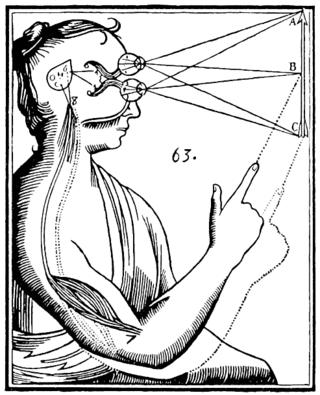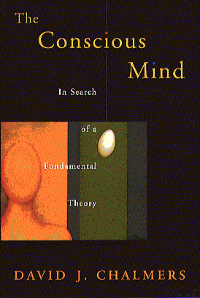Related Research Articles
Neutral monism is an umbrella term for a class of metaphysical theories in the philosophy of mind, concerning the relation of mind to matter. These theories take the fundamental nature of reality to be neither mental nor physical; in other words it is "neutral".
In philosophy, physicalism is the metaphysical thesis that "everything is physical", that there is "nothing over and above" the physical, or that everything supervenes on the physical. Physicalism is a form of ontological monism—a "one substance" view of the nature of reality as opposed to a "two-substance" or "many-substance" (pluralism) view. Both the definition of "physical" and the meaning of physicalism have been debated.

Consciousness Explained is a 1991 book by the American philosopher Daniel Dennett, in which the author offers an account of how consciousness arises from interaction of physical and cognitive processes in the brain. Dennett describes consciousness as an account of the various calculations occurring in the brain at close to the same time. He compares consciousness to an academic paper that is being developed or edited in the hands of multiple people at one time, the "multiple drafts" theory of consciousness. In this analogy, "the paper" exists even though there is no single, unified paper. When people report on their inner experiences, Dennett considers their reports to be more like theorizing than like describing. These reports may be informative, he says, but a psychologist is not to take them at face value. Dennett describes several phenomena that show that perception is more limited and less reliable than we perceive it to be.

Sentience is the ability to experience feelings and sensations. The word was first coined by philosophers in the 1630s for the concept of an ability to feel, derived from Latin sentiens (feeling), to distinguish it from the ability to think (reason).

In the philosophy of mind, mind–body dualism denotes either the view that mental phenomena are non-physical, or that the mind and body are distinct and separable. Thus, it encompasses a set of views about the relationship between mind and matter, as well as between subject and object, and is contrasted with other positions, such as physicalism and enactivism, in the mind–body problem.
Artificial consciousness (AC), also known as machine consciousness (MC), synthetic consciousness or digital consciousness, is the consciousness hypothesized to be possible in artificial intelligence. It is also the corresponding field of study, which draws insights from philosophy of mind, philosophy of artificial intelligence, cognitive science and neuroscience. The same terminology can be used with the term "sentience" instead of "consciousness" when specifically designating phenomenal consciousness.

David John Chalmers (;) is an Australian philosopher and cognitive scientist specializing in the areas of philosophy of mind and philosophy of language. He is a professor of philosophy and neural science at New York University, as well as co-director of NYU's Center for Mind, Brain and Consciousness. In 2006, he was elected a Fellow of the Australian Academy of the Humanities. In 2013, he was elected a Fellow of the American Academy of Arts & Sciences.
In the philosophy of mind and consciousness, the explanatory gap is the difficulty that physicalist philosophies have in explaining how physical properties give rise to the way things feel subjectively when they are experienced. It is a term introduced by philosopher Joseph Levine. In the 1983 paper in which he first used the term, he used as an example the sentence, "Pain is the firing of C fibers", pointing out that while it might be valid in a physiological sense, it does not help us to understand how pain feels.
In the philosophy of mind, panpsychism is the view that the mind or a mindlike aspect is a fundamental and ubiquitous feature of reality. It is also described as a theory that "the mind is a fundamental feature of the world which exists throughout the universe". It is one of the oldest philosophical theories, and has been ascribed to philosophers including Thales, Plato, Spinoza, Leibniz, William James, Alfred North Whitehead, Bertrand Russell, and Galen Strawson. In the 19th century, panpsychism was the default philosophy of mind in Western thought, but it saw a decline in the mid-20th century with the rise of logical positivism. Recent interest in the hard problem of consciousness and developments in the fields of neuroscience, psychology, and quantum physics have revived interest in panpsychism in the 21st century.

In philosophy of mind, the hard problem of consciousness is to explain why and how humans and other organisms have qualia, phenomenal consciousness, or subjective experiences. It is contrasted with the "easy problems" of explaining why and how physical systems give a (healthy) human being the ability to discriminate, to integrate information, and to perform behavioral functions such as watching, listening, speaking, and so forth. The easy problems are amenable to functional explanation: that is, explanations that are mechanistic or behavioral, as each physical system can be explained purely by reference to the "structure and dynamics" that underpin the phenomenon.
A philosophical zombie is a being in a thought experiment in philosophy of mind that is physically identical to a normal person but does not have conscious experience.
Philosophy of mind is a branch of philosophy that studies the ontology and nature of the mind and its relationship with the body. The mind–body problem is a paradigmatic issue in philosophy of mind, although a number of other issues are addressed, such as the hard problem of consciousness and the nature of particular mental states. Aspects of the mind that are studied include mental events, mental functions, mental properties, consciousness and its neural correlates, the ontology of the mind, the nature of cognition and of thought, and the relationship of the mind to the body.

Michael Tye is an analytic philosopher who is currently the Dallas TACA Centennial Professor in Liberal Arts at the University of Texas at Austin. He has made significant contributions to the philosophy of mind.

The Conscious Mind: In Search of a Fundamental Theory was published in 1996, and is the first book written by David Chalmers, an Australian philosopher specialising in philosophy of mind. Although the book has been greatly influential, Chalmers maintains that it is "far from perfect", as most of it was written as part of his PhD dissertation after "studying philosophy for only four years".
Joseph Levine is an American philosopher at the University of Massachusetts Amherst who received his PhD from Harvard University in 1981.
The phenomenal concept strategy (PCS) is an approach within philosophy of mind to provide a physicalist response to anti-physicalist arguments like the explanatory gap and philosophical zombies. The name was coined by Daniel Stoljar. As David Chalmers put it, PCS "locates the gap in the relationship between our concepts of physical processes and our concepts of consciousness, rather than in the relationship between physical processes and consciousness themselves." The idea is that if we can explain why we think there's an explanatory gap, this will defuse the motivation to question physicalism.

In philosophy, further facts are facts that do not follow logically from the physical facts of the world. Reductionists who argue that at bottom there is nothing more than the physical facts thus argue against the existence of further facts. The concept of further facts plays a key role in some of the major works in analytic philosophy of the late 20th century, including in Derek Parfit's Reasons and Persons, and David Chalmers's The Conscious Mind.
Christopher S. Hill is an American philosopher and William Herbert Perry Faunce Professor of Philosophy at Brown University. He is known for his expertise on consciousness and philosophy of mind.

The ethics of uncertain sentience refers to questions surrounding the treatment of and moral obligations towards individuals whose sentience—the capacity to subjectively sense and feel—and resulting ability to experience pain is uncertain; the topic has been particularly discussed within the field of animal ethics, with the precautionary principle frequently invoked in response.

Philip Goff is a British author, Idealist philosopher, and professor at Durham University whose research focuses on philosophy of mind and consciousness. Specifically, it focuses on how consciousness can be part of the scientific worldview. Goff holds that materialism is incoherent and that dualism leads to "complexity, discontinuity and mystery". Instead, he advocates a "third way", a version of Russellian idealist monism that attempts to account for reality's intrinsic nature by positing that consciousness is a fundamental, ubiquitous feature of the physical world. "The basic commitment is that the fundamental constituents of reality—perhaps electrons and quarks—have incredibly simple forms of experience."
References
- ↑ "Kirk, Robert 1933-". WorldCat Identities. Retrieved 25 December 2018.
- ↑ Kirk, Robert (January 1974). "Sentience and Behaviour". Mind. 83 (329): 43–60. doi:10.1093/mind/lxxxiii.329.43. JSTOR 2252795.
- ↑ Kirk, Robert (1974). "Zombies v. Materialists". Proceedings of the Aristotelian Society. 48 (Suppl): 135–152. doi:10.1093/aristoteliansupp/48.1.135.
- ↑ Chalmers, David (1996). The Conscious Mind: in Search of a Fundamental Theory . Oxford University Press. ISBN 978-0-19-510553-7.
- ↑ Kirk, Robert (1979). "From Physical Explicability to Full-blooded Materialism". Philosophical Quarterly. 29 (116): 229–37. doi:10.2307/2218819. JSTOR 2218819.
- ↑ — (1994). Raw Feeling: A Philosophical Account of the Essence of Consciousness. Oxford University Press.
- ↑ — (2005). Zombies and Consciousness. Oxford University Press. ISBN 0-19-928548-9.
- ↑ — (2008). "The Inconceivability of Zombies". Philosophical Studies. 39: 73–98. doi:10.1007/s11098-007-9103-2. S2CID 170126603.
- ↑ — (2013). The Conceptual Link from Physical to Mental. Oxford University Press.
- ↑ — (2017). Robots, Zombies and Us. Bloomsbury.
- ↑ — (1986). Translation Determined . Oxford University Press. ISBN 978-0-19-824921-4.
- ↑ — (1999). Relativism and Reality. Routledge.